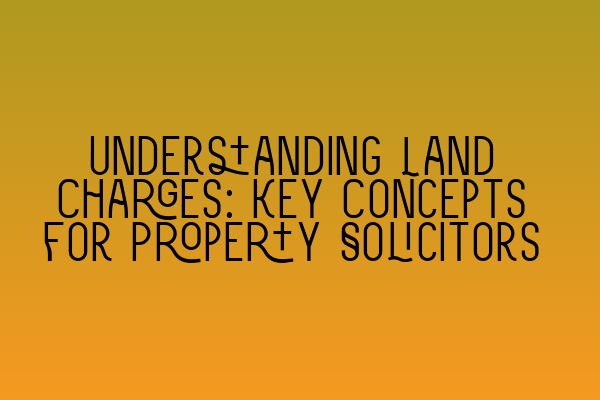Understanding Land Charges: Key Concepts for Property Solicitors
As a property solicitor, it is essential to have a deep understanding of land charges and their implications on property transactions. Land charges can have a significant impact on the ownership and use of a property, so being well-versed in this area of law is crucial for providing the best advice to your clients. In this blog post, we will explore some key concepts related to land charges that every property solicitor should be familiar with.
1. What are Land Charges?
Land charges are legal burdens or restrictions that affect a property and are registered against it. These charges can be created by statute, agreement, or court order and are recorded in the Land Charges Register. They can potentially restrict the use, development, or transfer of a property, making it vital to identify and understand them before engaging in any property transactions.
2. Types of Land Charges
There are various types of land charges that property solicitors need to be aware of. Some common examples include:
– Restrictive Covenants: These are obligations or agreements imposed on a property that limit its use or development. Restrictive covenants can affect the property’s value or prescribe specific conditions that must be met before certain actions can be taken. For instance, a property may have a covenant prohibiting the construction of additional buildings or requiring permission for any structural alterations.
– Easements: Easements grant specific rights to individuals or entities other than the property owner. They include rights of way, rights to access services, or rights of light. Easements can have a significant impact on property transactions, especially when they affect access or utility provisions.
– Equitable Charges: Equitable charges can be created through agreements, such as mortgages or loans, and do not require registration with the Land Charges Register. They are enforceable in equity and can affect the priority of other charges registered against the property.
– Legal Mortgages: Legal mortgages provide security for a loan or debt by granting the lender an interest in the property. They need to be registered at the Land Charges Department for them to be binding against certain third parties.
Understanding these types of land charges and their implications is crucial for property solicitors to mitigate potential risks and ensure smooth property transactions.
3. Land Charges Searches
Performing comprehensive land charges searches is an integral part of the due diligence process for property solicitors. These searches aim to identify any registered land charges affecting the property. The searches are essential because certain land charges may not be readily apparent from physical inspections or property documentation.
By conducting thorough land charges searches, you can protect your clients’ interests by uncovering any potential restrictions or encumbrances that may impact the property’s value or use.
4. The Land Charges Register
The Land Charges Register is the official record of land charges in England and Wales. It is administered by the Land Charges Department and can be accessed by property solicitors and members of the public.
When conducting land charges searches, property solicitors should obtain official copies of entries from the Land Charges Register to ensure accuracy and completeness. These official copies provide crucial information about the registered charges, including the relevant parties, dates, and any associated documents or restrictions.
5. Priority and Discharge of Land Charges
Understanding the priority and discharge of land charges is essential for property solicitors involved in complex property transactions. Priority determines the order in which land charges are paid off in the event of a property sale or foreclosure. Any subsequent charges may be subordinate to earlier registered charges, affecting the distribution of funds in the event of default.
Discharging a land charge involves removing it from the Land Charges Register. This typically occurs when the charge has been paid off, released, or becomes unenforceable. Property solicitors need to ensure that all discharge formalities are properly completed to protect their clients’ interests and ensure a clear title.
Conclusion
Having a strong understanding of land charges is fundamental for property solicitors. By familiarizing themselves with the various types of land charges, conducting thorough searches, and understanding priority and discharge, they can provide the best advice and guidance to their clients.
If you’re a property solicitor looking to enhance your knowledge and skills in property law and land law, SQE Property Law & Land Law offers comprehensive preparation courses for both SQE 1 and SQE 2 exams. Our courses are designed to equip you with the necessary knowledge and skills to excel in your legal career. Check out our related articles for more information:
– SQE 1 Practice Exam Questions
– SQE 1 Practice Mocks FLK1 FLK2
– SQE 2 Preparation Courses
– SQE 1 Preparation Courses
– SRA SQE Exam Dates
Make sure to stay up to date with the latest developments in land charges legislation and seek expert advice when dealing with complex property transactions.
